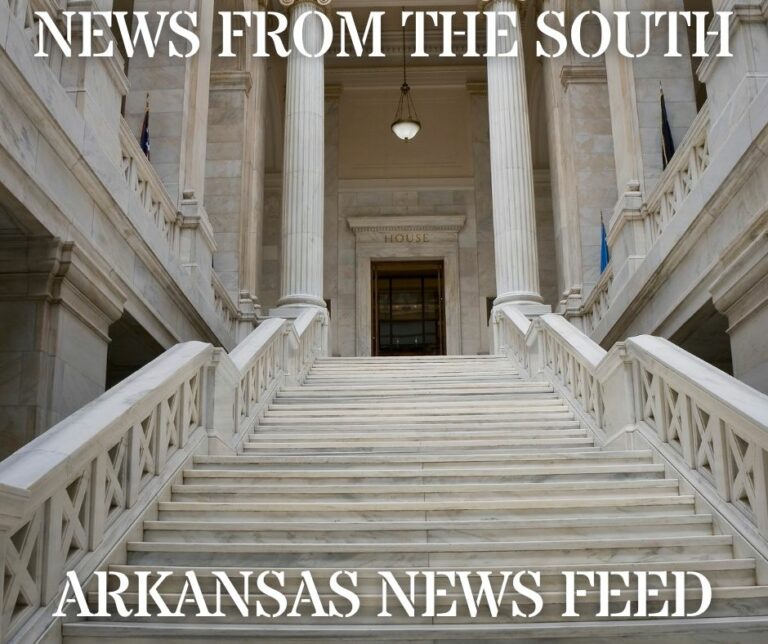News from the South - Tennessee News Feed
Amid protests and Democratic pushback, U.S. House GOP launches work on Medicaid cuts
by Jennifer Shutt, Tennessee Lookout
May 13, 2025
WASHINGTON — The U.S. House committee tasked with overhauling energy policy and Medicaid to achieve $880 billion in spending cuts on Tuesday began what was expected to be a long, grueling session with debate on dozens of amendments.
Republicans on the panel argued during opening statements the proposed changes are necessary to realign several programs with President Donald Trump’s campaign promises and some long-standing GOP policy goals, primarily an extension of the 2017 tax cuts.
Democrats contend the legislation, one of 11 measures that will make up the GOP’s “big, beautiful bill,” would kick millions of people out of Medicaid, the state-federal program for lower income Americans, some people with disabilities and a considerable number of nursing home patients.
Energy and Commerce Committee Chairman Brett Guthrie, R-Ky., said the GOP bill is aimed at reducing waste, fraud and abuse within Medicaid “by beginning to rein in the loopholes, by ensuring states have the flexibility to remove ineligible recipients from their roles and removing beneficiaries who enrolled in multiple states.”
“We make no apologies for prioritizing Americans in need over illegal immigrants and those who are capable but choose not to work,” Guthrie said. “Our priority remains the same: strengthen and sustain Medicaid for those whom the program was intended to serve — expectant mothers, children, people with disabilities and the elderly.”
Democratic New Jersey Rep. Frank Pallone, ranking member on the panel, rejected comments that the GOP bill was “moderate” and said it clearly was not aimed at addressing waste, fraud and abuse.
“Medicaid is a life-saving program that 80 million Americans count on every day,” Pallone said. “It provides health care to 1 in 3 Americans and nearly half of all children in the United States. It covers close to half of all births. And it’s the largest source of funding for long-term care for seniors and people living with disabilities. With this bill, Republicans are essentially telling millions of Americans, ‘Gotcha, no more health care for you.’”
Pallone added that Republican lawmakers were “intentionally taking health care away from millions of Americans, so they can give giant tax breaks to the ultra-rich, who frankly don’t need them.”
Just before Pallone spoke, several protesters in the room, including at least three people in wheelchairs, began chanting “No cuts to Medicaid” and were led out by U.S. Capitol Police, who charged 25 people with illegally demonstrating in the Rayburn House Office Building.
Photos of constituents
Democrats gave numerous opening statements at the start of the markup, each holding up a large photograph of one of their constituents on Medicaid and sharing stories of how the program helped them get or keep access to health care after complex diagnoses, like congestive heart failure, leukemia and cerebral palsy.
Democratic lawmakers expressed concern those people would lose access to the health care program if the GOP bill becomes law.
“You don’t just gut the largest insurer of low income Americans without real harm,” said Illinois Democratic Rep. Robin Kelly. “Call it what it is — abandonment, disinvestment and pure disregard for human life.”
Florida Republican Rep. Kat Cammack rebuked some of the Democrats’ comments, which she said sought to fearmonger and lie to people about what was in the GOP bill.
“The posters that our colleagues on the left have held up are touching. The stories, they’re very emotional. And I agree that we want to protect those most vulnerable,” Cammack said. “As a pregnant woman, I want to make sure that pregnant women, expectant mothers have access to resources around the country.”
Cammack added that “not a single person in those posters is going to be impacted by this legislation.”
Floor action as soon as next week
Republicans have already approved eight of the reconciliation bills in committee and are scheduled to wrap up work on the remaining three measures this week. The Ways and Means Committee began debating the tax bill shortly after Energy and Commerce began its markup, and the Agriculture panel was scheduled to begin its debate Tuesday evening.
Later this week, the House Budget Committee plans to bundle all 11 bills together and send the full package to the floor. The entire House is set to vote on the legislation before Memorial Day.
GOP leaders cannot afford much disagreement over the entire package, given their paper-thin majority in the House. If all of the current members are present at the vote, just three Republicans can oppose the package and still have it pass.
The same margin exists in the Senate, which is expected to make substantial changes to the package should the House approve the measure and send it across the Capitol.
$880 billion cut
The Energy and Commerce Committee’s bill up for debate Tuesday met the panel’s goal of cutting at least $880 billion in federal spending during the next decade, according to a letter from the nonpartisan Congressional Budget Office.
Congress’ official scorekeepers, however, hadn’t released their full analysis of the panel’s bill before the start of the debate and amendment process, known in Congress as a markup.
Once those details are made public, lawmakers and the voters who elected them will have a much more detailed look at how each of the proposed changes will affect federal revenue, spending and the number of people who could lose access to Medicaid.
Democrats released a CBO analysis last week showing the impact of various proposals, though Energy and Commerce GOP staff cautioned Monday during a background briefing that what they proposed in the actual bill didn’t completely align with those scenarios.
The bill would make considerable changes to Medicaid if the House and Senate approve the legislation as written, which seems highly unlikely, given objections from several GOP senators, including Missouri’s Josh Hawley.
The House legislation would require able-bodied people between the ages of 19 and 65 to work, participate in community service, or attend an education program for at least 80 hours a month. There would be exceptions for pregnant people, Medicaid enrollees with dependent children and people with complex medical issues, among other exclusions.
That provision would take effect on Jan. 1, 2029, according to an explainer on the bill from nonpartisan health research organization KFF.
States would be required to check eligibility for all Medicaid patients every six months, lowering the threshold from one year for people eligible for the program under the expansion in the 2010 Affordable Care Act. That would need to begin by Oct. 1, 2027.
Republicans are seeking to get the 12 states that allow immigrants without legal status into their Medicaid programs to change course by lowering the percent the federal government pays for those states’ expansion population enrollees from 90% to 80%. That would take effect Oct. 1, 2027.
The legislation seeks to block Medicaid funding for a narrow subset of health care providers who offer abortion services, which appeared to target Planned Parenthood.
The prohibition would apply to “providers that are nonprofit organizations, that are essential community providers that are primarily engaged in family planning services or reproductive services, provide for abortions other than for Hyde Amendment exceptions, and which received $1,000,000 or more (to either the provider or the provider’s affiliates) in payments from Medicaid payments in 2024,” according to a summary of the GOP bill. It would take effect as soon as the bill becomes law and last for a decade.
The Hyde Amendment allows federal funding for abortions that are the result of rape, or incest, or that endanger the life of the pregnant patient.
Planned Parenthood, SBA Pro-Life react
Planned Parenthood Action Fund President and CEO Alexis McGill wrote in a statement that defunding the organization and overhauling Medicaid would mean that “cancers will go undetected; it will be harder than ever to get birth control; the nation’s (sexually transmitted infection) crisis will worsen; Planned Parenthood health centers will close, making it significantly harder to get abortion care; and people across the country will suffer — all so the supremely wealthy can become even richer.”
SBA Pro-Life America President Marjorie Dannenfelser applauded the potential change to federal funding.
“It’s time to stop forcing taxpayers to fund the Big Abortion industry. Thanks to Speaker (Mike) Johnson and Energy and Commerce Committee Chairman Brett Guthrie, this year’s budget reconciliation bill contains the commonsense language to make that happen,” Dannenfelser wrote. “Taxpayers should never be mandated to prop up an industry that profits from ending lives and harming women and girls.”
More than 80 organizations, including the National Women’s Law Center and the Center for Reproductive Rights, wrote in a letter to congressional leaders that cutting off Medicaid funding for Planned Parenthood “would be catastrophic, shutting down health centers and stripping millions of patients across the country of access to essential and affordable health care.”
“In many communities, Planned Parenthood health centers are the only affordable provider with expertise in sexual and reproductive health,” the organizations wrote. “For those communities, the gap left by Planned Parenthood health centers would mean that many patients would have nowhere to turn for care.”
President of the American College of Obstetricians and Gynecologists Stella Dantas wrote in a statement the GOP’s changes to Medicaid might create challenges for pregnant patients seeking to access care and that some states may roll back their expansion of postpartum coverage from a full year.
“Pregnant patients who keep their coverage under Medicaid will still face challenges accessing care as labor and delivery unit closures escalate as a result of Medicaid cuts, leaving patients to travel longer distances to give birth,” Dantas wrote. “Ob-gyns are also concerned that the cuts will threaten the 12 months of postpartum coverage that we have fought so hard to achieve, and which will leave so many without access to medical care during the year after delivery when two-thirds of maternal deaths occur.
“Backsliding on our recent progress in increasing access to postpartum coverage puts lives at risk.”
American Public Health Association Executive Director Georges Benjamin wrote in a statement that House Republicans’ planned overhaul of Medicaid “does nothing to improve public health.”
“Instead, it would undermine much of the progress we have made to expand access to affordable, quality health insurance and implement other evidence-based measures to protect the public’s health,” Benjamin wrote. “We urge the House to reject this bill and instead work in a bipartisan manner on legislation to improve public health and expand access to health care for all Americans.”
Tennessee Lookout is part of States Newsroom, a nonprofit news network supported by grants and a coalition of donors as a 501c(3) public charity. Tennessee Lookout maintains editorial independence. Contact Editor Holly McCall for questions: info@tennesseelookout.com.
The post Amid protests and Democratic pushback, U.S. House GOP launches work on Medicaid cuts appeared first on tennesseelookout.com
Note: The following A.I. based commentary is not part of the original article, reproduced above, but is offered in the hopes that it will promote greater media literacy and critical thinking, by making any potential bias more visible to the reader –Staff Editor.
Political Bias Rating: Center-Left
This content largely presents the issue of Medicaid cuts and related policy changes from a perspective that highlights concerns raised by Democrats, advocacy groups, and health professionals about the negative impacts on vulnerable populations. It emphasizes protests, critiques from Democrats, and warnings from public health organizations about the consequences of GOP proposals, often portraying Republican efforts as harmful to access to healthcare. While it does include some Republican viewpoints and statements defending the legislation, the overall tone and selection of voices lean toward a critical, left-leaning framing of the GOP’s policy priorities and actions.
News from the South - Tennessee News Feed
Tennessee National Guard to join D.C. police order
by Sam Stockard, Tennessee Lookout
August 19, 2025
Tennessee Gov. Bill Lee is dispatching National Guard troops to Washington, D.C., this week to join the president’s law enforcement takeover in the nation’s capital.
Acting on orders from President Donald Trump, the governor granted a request to help the District of Columbia National Guard with a “security mission,” spokesperson Elizabeth Johnson said.
Tennessee will join several other Republican-controlled states and send 160 Guard troops this week to D.C. “to assist as long as needed,” according to Johnson. They will work with local and federal law enforcement agencies on monument security, community safety patrols, federal facilities protection and traffic control, she said.
The Tennessee Guard deployment will be funded and regulated by the federal government.
At least four other Republican governors are sending nearly 1,000 National Guard troops to D.C. after Trump activated 800 D.C. soldiers.
Trump ordered the federal takeover of Washington, D.C., law enforcement despite opposition from local officials who said crime is down some 30%.
Following a legal challenge by D.C. officials, the Trump administration backed off appointing a federal official to head the department and agreed to leave the city’s police chief in command. U.S. Attorney General Pam Bondi, though, told local police to work with federal officers on immigration enforcement even if city laws are conflicting.
Lee also said he would deploy National Guard troops to provide logistical help with Immigration and Customs Enforcement officers in Tennessee so they can spend more time on deportation.
Democratic state Rep. John Ray Clemmons of Nashville accused the governor of “uprooting” Guard personnel from their families to distract people from Trump’s “refusal to release the Epstein files,” a reference to the Jeffrey Epstein sex trafficking investigation and whether Trump is mentioned in the documents.
Clemmons pointed out violent crime in D.C. decreased by 26% this year while overall crime is down by 7%.
“If Trump was serious about addressing crime in D.C., all he and Congress have to do is better support and fund D.C. police, as they have the power to do, rather than militarize one of the most beautiful cities in America,” Clemmons said.
YOU MAKE OUR WORK POSSIBLE.
Tennessee Lookout is part of States Newsroom, a nonprofit news network supported by grants and a coalition of donors as a 501c(3) public charity. Tennessee Lookout maintains editorial independence. Contact Editor Holly McCall for questions: info@tennesseelookout.com.
The post Tennessee National Guard to join D.C. police order appeared first on tennesseelookout.com
Note: The following A.I. based commentary is not part of the original article, reproduced above, but is offered in the hopes that it will promote greater media literacy and critical thinking, by making any potential bias more visible to the reader –Staff Editor.
Political Bias Rating: Left-Leaning
The content presents a critical view of Republican actions, particularly focusing on Tennessee Governor Bill Lee and former President Donald Trump’s deployment of the National Guard to Washington, D.C. It emphasizes opposition from Democratic officials and highlights concerns about militarization and distraction from other issues. The article’s framing and choice of quotes suggest a perspective that leans toward the left side of the political spectrum, critiquing conservative policies and leadership decisions.
News from the South - Tennessee News Feed
Survey shows Tennessee teachers’ feelings about cell phones, disciplinary measures and school culture
SUMMARY: A recent Tennessee Education Survey of nearly 40,000 teachers reveals most middle and high school teachers find cellphone use disruptive, with 73% reporting cheating via phones. While 94% say schools restrict phone use during class, half of high school teachers want a full campus ban. A new state law bans wireless devices during instruction but lets districts set specific rules. Teacher retention is driven mainly by school culture, despite only a third being satisfied with pay. Most teachers support current discipline methods and evaluations, with early-career teachers spending more time on discipline but generally satisfied with evaluations improving their teaching.
Read the full article
The post Survey shows Tennessee teachers’ feelings about cell phones, disciplinary measures and school culture appeared first on wpln.org
News from the South - Tennessee News Feed
U.S. Agriculture secretary backs Tennessee higher ed grant cuts
by Sam Stockard, Tennessee Lookout
August 18, 2025
U.S. Agriculture officials announced a new initiative Monday to stop subsidies for solar energy panels that take up farmland while supporting cuts in agriculture grants to Tennessee universities.
Agriculture Secretary Brooke Rollins introduced the initiative by the Trump administration after a Future Farmers of America breakfast at the State Fairgrounds in Lebanon where she said the federal government will make new grants to bolster Tennessee farming while targeting grants that don’t help farmers’ production.
Rollins criticized the Biden administration’s Inflation Reduction Act and “market distorting incentives” for solar panels, which she said are eliminating Tennessee farmland.
The secretary made the statements even though a study by the nonpartisan Tennessee Advisory Commission on Intergovernmental Relations found that solar facilities aren’t likely to be the “primary driver” of development on farmland for decades. The study also determined that land can be returned to farming once a solar facility goes out of use.
Earlier this year, the federal government made dramatic cuts to higher education grants, including eliminating more than $31 million in funding to the University of Tennessee Institute of Agriculture, which houses agricultural research and resources for Tennessee farmers and communities in 95 counties.
Rollins defended the reductions, saying “Those cuts were being made in programs that did not align with the president’s vision of putting farmers first.”
Deputy Secretary Stephen Vaden of Tennessee described the reduction as a “repurposing” and said changes were made in research funding based on whether a grant “helps a farmer in the field make more money.” Projects aimed at “clean energy” or based on “racial criteria” were eliminated, he said.
In addition to stopping solar panel development on farmland, Rollins announced that nearly $89 million will go toward 13 rural development projects in 28 Tennessee counties to “promote partnerships” and infrastructure investments for rural education. The department has distributed nearly $100 million this year to more than 10,000 farmers through the Emergency Commodity Assistance Program, according to Rollins.
Some farmers have said they expect prices to increase because of President Donald Trump’s tariffs, which are forcing them to pass on higher rates to customers. Rollins said Monday the administration has signed eight new trade agreements expected to boost the nation’s economy.
GET THE MORNING HEADLINES.
Tennessee Lookout is part of States Newsroom, a nonprofit news network supported by grants and a coalition of donors as a 501c(3) public charity. Tennessee Lookout maintains editorial independence. Contact Editor Holly McCall for questions: info@tennesseelookout.com.
The post U.S. Agriculture secretary backs Tennessee higher ed grant cuts appeared first on tennesseelookout.com
Note: The following A.I. based commentary is not part of the original article, reproduced above, but is offered in the hopes that it will promote greater media literacy and critical thinking, by making any potential bias more visible to the reader –Staff Editor.
Political Bias Rating: Center-Left
The article largely reports on U.S. Agriculture Secretary Brooke Rollins’ policy announcements but introduces balancing context that slightly shifts the tone. While it covers her criticisms of the Biden administration and defense of Trump-era cuts, it also highlights a nonpartisan Tennessee study contradicting her claims about solar panels reducing farmland. This inclusion, along with details on higher education grant cuts and references to “racial criteria” in funding, frames the administration’s moves with a degree of skepticism. The reporting avoids overt editorializing but leans toward questioning Republican policies, giving it a mild Center-Left tilt.
-
News from the South - Tennessee News Feed5 days ago
GRAPHIC VIDEO WARNING: Man shot several times at point-blank range outside Memphis convenience store
-
News from the South - Texas News Feed4 days ago
Kratom poisoning calls climb in Texas
-
News from the South - Texas News Feed2 days ago
New Texas laws go into effect as school year starts
-
News from the South - Florida News Feed2 days ago
Floridians lose tens of millions to romance scams
-
News from the South - Kentucky News Feed5 days ago
Unsealed warrant reveals IRS claims of millions in unreported sales at Central Kentucky restaurants
-
Our Mississippi Home7 days ago
Pride of Mississippi Marching Band to Kick Off Season with Free Concert
-
News from the South - Arkansas News Feed7 days ago
Idaho is losing OB-GYNs. Doctors who remain are trying to shoulder the extra burdens.
-
Mississippi Today5 days ago
‘Get a life,’ Sen. Roger Wicker says of constituents













































